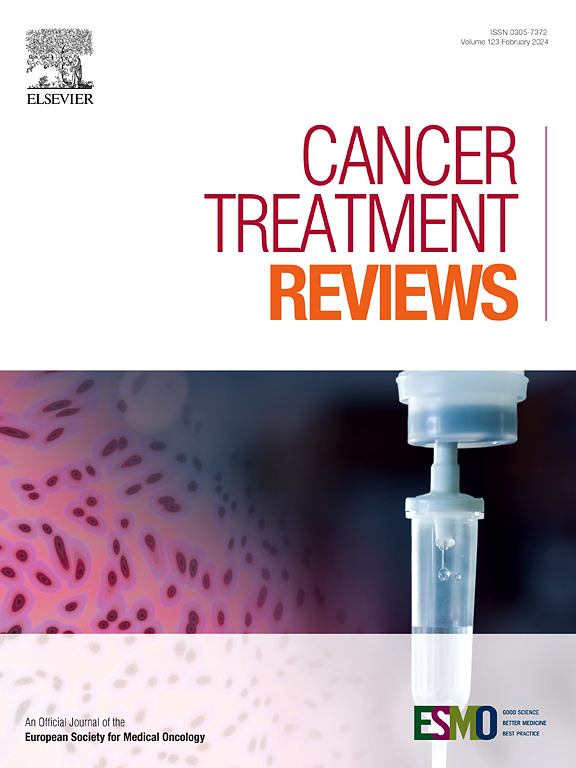Challenges and perspectives in the management of BRAF-mutated metastatic melanoma: Systemic treatment sequencing and brain metastases
IF 9.6
1区 医学
Q1 ONCOLOGY
引用次数: 0
Abstract
The global incidence of metastatic melanoma with BRAF mutations, characterized by aggressive behavior and poor prognosis, is rising. Recent treatment advances, including immune checkpoint inhibitors (ICI) and targeted therapies (TT) such as BRAF and MEK inhibitors, have significantly enhanced patient outcomes. Although guidelines recommend sequencing strategies, real-world implementation can be influenced by clinical scenarios. This article highlights the importance of tailored treatment strategies, emphasizing that the decision to initiate immunotherapy (IT) or TT hinges on multiple factors, including tumor burden, LDH levels, presence of brain metastases, and patient symptomatic status. Managing brain metastases also poses a challenge, as these patients are typically excluded from pivotal clinical trials. While insights from phase II studies provide some guidance, there is a critical need for more quality data to inform comprehensive recommendations. Furthermore, although triple therapy combining IT and TT was initially thought to be promising, it has failed to clearly demonstrate benefit over current treatments. For all these reasons, there is an imperative need for further research on biomarkers and predictive factors, as well as real-world studies, that will help tailor treatment strategies across diverse patient subsets, thereby refining therapeutic approaches for BRAF-mutated metastatic melanoma.
braf突变转移性黑色素瘤治疗的挑战和前景:系统性治疗序列和脑转移。
具有BRAF突变的转移性黑色素瘤的全球发病率正在上升,其特征是攻击性行为和预后不良。最近的治疗进展,包括免疫检查点抑制剂(ICI)和靶向治疗(TT),如BRAF和MEK抑制剂,显著提高了患者的预后。虽然指南推荐测序策略,但现实世界的实施可能受到临床情况的影响。本文强调了量身定制治疗策略的重要性,强调启动免疫治疗(IT)或TT的决定取决于多种因素,包括肿瘤负荷、LDH水平、脑转移的存在和患者的症状状态。管理脑转移也带来了挑战,因为这些患者通常被排除在关键的临床试验之外。虽然来自II期研究的见解提供了一些指导,但迫切需要更多高质量的数据来提供全面的建议。此外,尽管最初认为IT和TT相结合的三联疗法很有希望,但它未能明确证明优于当前治疗方法的益处。由于所有这些原因,迫切需要进一步研究生物标志物和预测因素,以及现实世界的研究,这将有助于针对不同患者亚群量身定制治疗策略,从而改进braf突变转移性黑色素瘤的治疗方法。
本文章由计算机程序翻译,如有差异,请以英文原文为准。
求助全文
约1分钟内获得全文
求助全文
来源期刊

Cancer treatment reviews
医学-肿瘤学
CiteScore
21.40
自引率
0.80%
发文量
109
审稿时长
13 days
期刊介绍:
Cancer Treatment Reviews
Journal Overview:
International journal focused on developments in cancer treatment research
Publishes state-of-the-art, authoritative reviews to keep clinicians and researchers informed
Regular Sections in Each Issue:
Comments on Controversy
Tumor Reviews
Anti-tumor Treatments
New Drugs
Complications of Treatment
General and Supportive Care
Laboratory/Clinic Interface
Submission and Editorial System:
Online submission and editorial system for Cancer Treatment Reviews
 求助内容:
求助内容: 应助结果提醒方式:
应助结果提醒方式:


